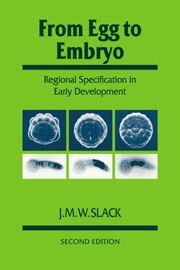Book contents
- Frontmatter
- Contents
- Preface to the second edition
- Preface to the first edition
- 1 Regional specification in animal development
- 2 The concepts of experimental embryology
- 3 Theoretical embryology
- 4 Hierarchies of developmental decisions
- 5 Development with a small cell number
- 6 Models for Man: the mouse and the chick
- 7 The breakthrough
- 8 What does it all mean?
- Appendix: How to write a program for development
- References
- Index
Preface to the second edition
Published online by Cambridge University Press: 16 October 2009
- Frontmatter
- Contents
- Preface to the second edition
- Preface to the first edition
- 1 Regional specification in animal development
- 2 The concepts of experimental embryology
- 3 Theoretical embryology
- 4 Hierarchies of developmental decisions
- 5 Development with a small cell number
- 6 Models for Man: the mouse and the chick
- 7 The breakthrough
- 8 What does it all mean?
- Appendix: How to write a program for development
- References
- Index
Summary
The first edition of From Egg to Embryo was written in 1981–82 which was before the techniques of molecular biology had made a serious impact on the problem of regional specification. Over recent years there has been an absolute explosion of new molecular data, led by the work on Drosophila, but with Xenopus, the sea urchin and the mouse also participating. I felt that the right time for a second edition would be when the Drosophila work showed some signs of stabilizing, which it now seems to be doing.
The aims of the first edition were two-fold: to explain the theoretical basis of the regional specification problem and to summarize, in a compact form, the essential experimental data relating to early embryos. The molecular biology explosion has imposed a third goal on the second edition, which is to give the reader a map for navigating through a world of molecular detail. There are now so many potentially interesting genes being studied in so many experimental systems that it is essential to keep the logical and the dynamical categories of explanation to the forefront in order to decide what to remember and what to put in the database.
From Egg to Embryo is written for anyone who is interested in embryos and so does not conform to any particular course of study.
- Type
- Chapter
- Information
- From Egg to EmbryoRegional Specification in Early Development, pp. xv - xviiiPublisher: Cambridge University PressPrint publication year: 1991

